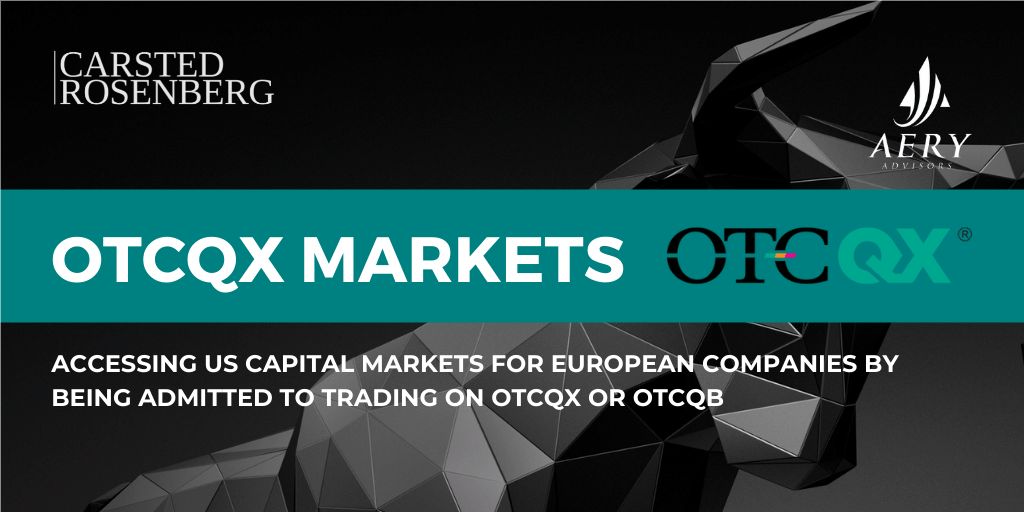An innovative “side door” entry into the lucrative US capital market
Many companies dream of going public and listing their business on a national stock exchange. The problem with achieving your dreams is the inevitable question of “What's next?” How can you take your enterprise even further to the next level of success?
If you are a foreign (i.e. non-US) publicly listed company, could you, for example, sell your shares to US investors? It depends. Buying shares from a foreign (i.e non-US) stock exchange is not easy for American investors thanks to various state and federal regulations. It’s certainly possible through European affiliates, but generally only very large investment houses and organizations have the infrastructure and legal teams to do this. For everyone else, the obstacles are pretty tough.
Listing your stock on an American market such as the New York Stock Exchange (NYSE) or the Nasdaq might seem like a better solution, but is it possible to make your shares available both in your home country and in the US without listing on a US exchange?
The hard way
There are two main ways of doing it. Let’s call them the hard way and the easy way. The hard way is to go in through the front door, which means registering with the US Securities Exchange Commission (SEC). This involves completing a very detailed registration and disclosure statement – a long process that requires considerable legal and accounting fees.
This registration document would then be reviewed and hopefully approved. Then there would be ongoing expenses because you’re officially a “reporting issuer.” You would also be subject to US regulatory oversight, jurisdiction and liability. It’s a whole other level of scrutiny on your business.
Again, a very large company with its teams of international lawyers and accountants, and a big investment of time and cost, can justify the time and expense as simply a "cost of doing business" to go through front door of the world's largest capital market. Why not? But not all companies have the human and capital resources to do that.
The side door
This is where the OTC comes in. The Over-the-Counter marketplace is not a “listing” in the traditional sense, but it is a marketplace for certain qualified foreign public companies to sell their shares to US investors without going through the lengthy and costly SEC registration and reporting processes. European companies don’t have to register to sell their shares because they are already registered and regulated by their home exchange.
Basically, the order execution – the purchase of shares – originates on the US side and is directed automatically back to the home market (the London Stock Exchange or Frankfurt Stock Exchange or wherever your shares are listed) for final settlement.
How does it work? Companies listed on approved non-US stock exchanges go through the OTC Sponsorship process to check if they are eligible. The official sponsors are typically investment banks or law firms who go through a checklist of requirements and prepare the application for you.
It’s not necessary to be on a highly recognized exchange such as the LSE. There are many other qualified foreign exchanges in second or third-tier markets that meet the basic OTC sponsorship eligibility requirement.
In terms of cost, there’s a one-off OTC fee of $23,000 and a sponsorship fee plus various miscellaneous expenses, but that’s it – your shares are now available to American investors in the world’s largest capital market. It’s a much simpler and cheaper process than going through the SEC, which is why so many global companies use it.
In fact, more than 600 companies from 30+ countries cross-trade their securities on OTC. They include Adidas AG, BASF SE, Hugo Boss AG, Deutsche Lufthansa AG, Deutsche Telekom AG, Roche Holding Ltd, Zurich Insurance Group Ltd, BNP Paribas, Akzel Nobel, Repsol, AXA Financial Group and Experian.
Pros and cons
Simplicity is the greatest advantage of the OTC route. Your business only needs to think about its home jurisdiction, filing periodic reports on time as it would anyway. The only potential catch is that the OTC requires all such reports in English, which is not a huge issue. A simple translation of the existing Swedish or Danish or German or French (et al) report is required.
It’s not necessary to file with the OTC. You simply deal with your home market as you normally do and the information automatically becomes available to US investors, both retail and institutional. Any shares bought from the US are settled in your home market.
One of the major benefits of opening your shares to a wider market is increasing demand, which in turn increases liquidity. Studies have shown that liquidity in home markets does indeed increase because US investors are buying and selling the shares and the orders are being directed back to your home market.
Liquidity is a good thing. Institutional investors might want to have a bigger stake in your business but may fear that unloading their stake might negatively impact the price if the shares are too thinly traded. More liquidity means bigger blocks of shares can be purchased without necessarily impacting the price or the volume limitations.
Obviously, if you have demand in the US, liquidity in the US market increases also. Studies show that on average there's an increase in the market cap or basis point valuation. It’s just simple supply and demand.
One thing to keep in mind about American markets is that the US has a highly litigious culture. Securities laws are enforced by the regulators and by the private plaintiff's bar. There are lawyers everywhere looking for blood in the water! This is a real fear.
However, the risk is considerably lessened if you go the OTC route. There’s far less liability than the SEC route because you haven't consented in a registration process to submit to the jurisdiction of the United States.
There are some very rare circumstances under which you may be required to register and list with the SEC. For example, if your American investors fall in love with your stock and you end up selling much more in the US than in your home market, then you may have to register. But that’s what we might call a “good problem,” right?
The main takeaway is that for non-US-listed public companies who want to get their shares quoted in the US, the OTC market offers a fast, easy and cost-effective way to get it done.
Watch the full podcast episode:
On December 14th, 2022 Aery Advisors together with OTC Markets Group, Carsted Rosenberg and Media and Games Invest Group hold a live webinar on "OTCQX: An International Gateway to US investors. Nasdaq First North Growth Market Case Study."
If you'd like more information on getting your shares quoted in the US, please get in touch with us today.
Watch previous Season podcast episodes here: aeryadvisors.com/podcast/
Don`t forget to subscribe to Aery Advisors' Youtube Channel: aeryadvisors.com/youtube/

